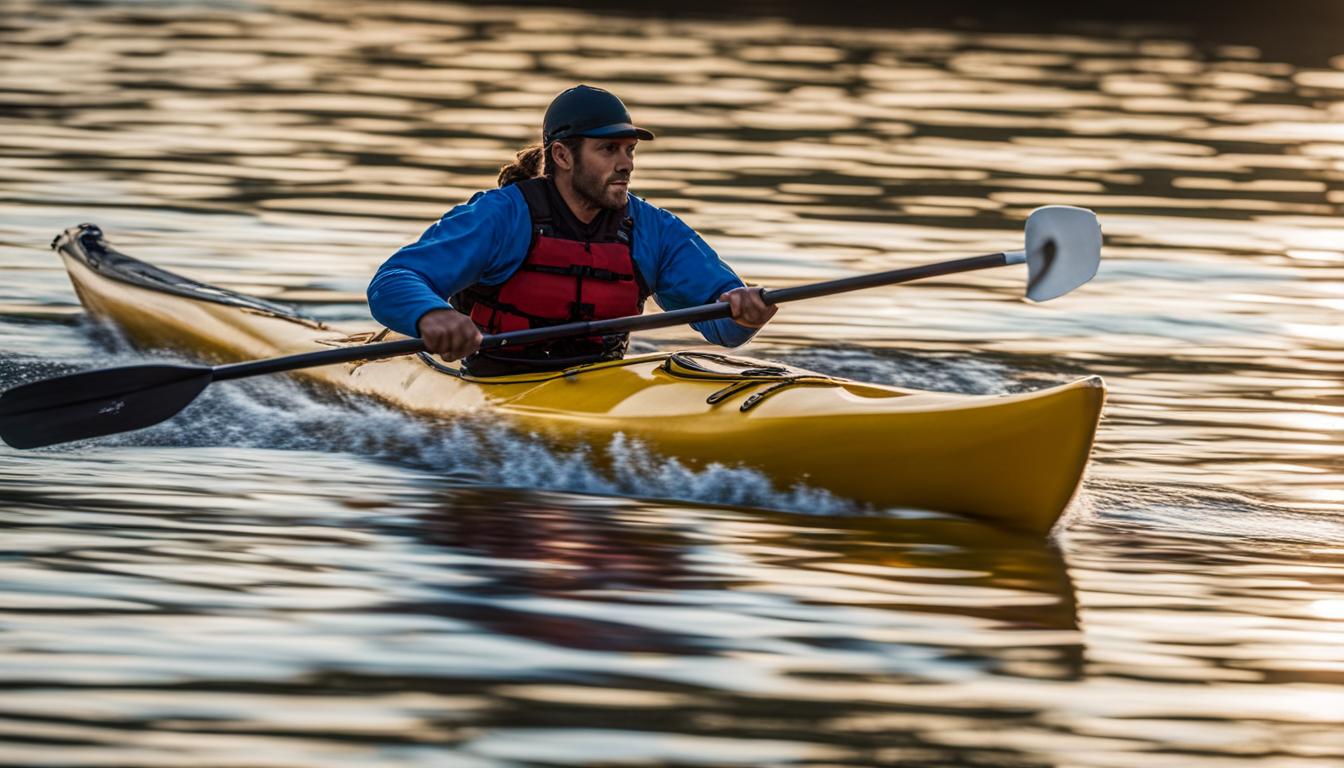When it comes to paddling, it’s not just about physical strength and technique. The mental aspect plays a crucial role in performance on the water. Neglecting mental training can hinder your progress and hinder your ability to reach your full potential. To enhance your mental focus and improve your paddling skills, incorporating mental strategies into your training routine is essential.
Key Takeaways:
- Investing in mental training can significantly improve your paddling performance.
- Developing mental toughness and concentration is crucial for success in paddling.
- Utilize mindfulness exercises and visualization techniques to enhance your mental focus.
- Overcoming mental challenges requires determination and a positive mindset.
- When paddling as a team, addressing the psychological aspects can boost overall performance.
The Importance of Mental Training in Paddling
Paddling is not just about physical strength and technique; it also requires mental conditioning and focus. Neglecting the mental aspect of training can significantly impact a paddler’s performance on the water. That’s why mental training strategies have become an essential component of paddling training routines, helping athletes improve their concentration, cognitive abilities, and overall performance.
Mental training plays a critical role in enhancing a paddler’s focus and concentration during training sessions and races. By incorporating specific cognitive techniques into their routines, paddlers can improve their ability to block out distractions and maintain optimal performance levels. These techniques may include visualization exercises, where paddlers mentally rehearse their strokes and visualize successful performances, or mindfulness practices that help them stay present and focused on the water.
Improving concentration in paddling is crucial, as it allows athletes to stay in the flow state, responding to the ever-changing conditions on the water with precision and agility. Mental conditioning for kayaking involves developing resilience, managing stress and pressure effectively, and staying motivated despite setbacks. It is a continuous process that requires dedication and practice, just like physical training. Incorporating cognitive techniques into the training regimen can provide paddlers with a competitive edge and unlock their full potential.
| Benefits of Mental Training in Paddling | |
|---|---|
| Improved Focus and Concentration | Enhanced Cognitive Abilities |
| Mental training techniques help paddlers stay focused on the task at hand, allowing them to make split-second decisions and react quickly to changes in the water conditions. | Mental conditioning exercises enhance cognitive abilities such as memory, problem-solving, and decision-making, which are crucial for optimal performance in paddling. |
| Effective Stress and Pressure Management | Increased Motivation and Mental Toughness |
| Mental training equips paddlers with tools to manage stress and pressure effectively, allowing them to stay calm and perform at their best even in challenging situations. | By incorporating mental training into their routines, paddlers develop mental toughness and motivation to push through obstacles, ultimately improving their performance on the water. |
Investing in mental training is not only beneficial for individual paddlers, but it also contributes to the overall success of a team. When each team member prioritizes their mental game, it enhances team dynamics, communication, and support, leading to improved performance and a positive training environment. Mental training is a key ingredient in achieving success and reaching new heights in the highly competitive world of paddling.

“Mental training is the bridge that connects physical strength and technique with optimal performance on the water. It is the key to unlocking your full potential as a paddler.” – Anonymous
Next Section: Techniques to Improve Mental Focus in Paddling
Techniques to Improve Mental Focus in Paddling
When it comes to paddling, maintaining a strong mental focus is essential for peak performance on the water. Luckily, there are a variety of techniques that can help paddlers enhance their mental focus and improve their overall paddling experience.
Mindfulness Exercises
One effective technique for improving mental focus in paddling is to incorporate mindfulness exercises into your training routine. Mindfulness involves being fully present and aware of your thoughts, feelings, and sensations in the present moment. You can practice mindfulness while paddling by focusing on your stroke technique, the rhythm of your breathing, or the sensation of the water against your paddle.
“Mindfulness exercises help paddlers stay present, tune out distractions, and maintain a strong mental focus.”
Counting strokes is another mindfulness exercise that can help you stay focused during long paddling sessions. By counting each stroke, you engage your mind and prevent it from wandering. This exercise promotes concentration and can be particularly useful during endurance races or when fatigue sets in.
Visualization
Another powerful technique for improving mental focus in paddling is visualization. Visualization involves mentally rehearsing your strokes and visualizing yourself successfully navigating the water. By creating vivid mental images of success, you can enhance your confidence and reinforce positive neural pathways in your brain.
During your visualization practice, try to engage all your senses. Feel the motion of your body as you paddle, hear the sound of the water splashing around you, and imagine the exhilaration of crossing the finish line. This multi-sensory approach can make your visualizations more vivid and impactful.
| Techniques | Benefits |
|---|---|
| Mindfulness exercises | Stay present, tune out distractions, and maintain focus |
| Counting strokes | Promote concentration and focus during endurance races |
| Visualization | Enhance confidence and reinforce positive neural pathways |
By incorporating mindfulness exercises and visualization into your paddling routine, you can sharpen your mental focus, boost your performance, and fully immerse yourself in the joy of paddling.
Overcoming Mental Challenges in Paddling
Paddling is not just about physical strength and technique; it also requires mental resilience to overcome the various challenges that arise on the water. Developing mental stamina and preparing for the psychological aspects of kayaking are key to achieving success in the sport.
One of the common mental challenges paddlers face is fatigue. Paddling for long durations can be physically and mentally demanding, but with proper mental training, paddlers can push through the fatigue and maintain their performance. It is important to reframe negative thoughts and focus on the feeling of accomplishment to stay motivated and overcome fatigue.
Another mental challenge in paddling is dealing with pain and discomfort. Paddlers often experience muscle soreness and exhaustion during intense training sessions or races. By cultivating a mindset of perseverance and determination, paddlers can push through the pain and maintain their focus on the ultimate goal. It is essential to develop mental toughness and embrace discomfort as part of the paddling journey.
“Paddling is not just a physical sport; it’s a mental game. Your mental state can make or break your performance on the water.”
Self-doubt is also a common mental challenge. Paddlers may question their abilities or fear failure, which can hinder performance. Mental preparedness and positive self-talk are crucial in overcoming self-doubt. By focusing on past successes and building confidence through mental training, paddlers can conquer their doubts and perform at their best.
Overcoming mental challenges requires a combination of mental stamina, preparation, and a positive mindset. Paddlers must prioritize mental training alongside physical training to develop the resilience and focus necessary for success on the water.

Mental Aspects of Paddling as a Team Sport
When it comes to paddling, the mental aspect goes beyond individual performance. As a team sport, paddling requires strong team dynamics and a collective focus on the mental aspects of the sport. Teamwork, communication, and support play a crucial role in achieving success on the water.
The Power of Teamwork and Collaboration
Paddling as a team requires synchronized movements and coordinated efforts. Each team member must trust and rely on one another to achieve optimal performance. Teamwork fosters a sense of unity and reinforces the notion that the team is greater than the sum of its parts. By working together towards a common goal, paddlers can leverage their individual skills and strengths, creating a powerful and cohesive unit.
Effective Communication for Seamless Execution
In the fast-paced environment of paddling, clear communication is essential. Effective communication ensures that everyone is on the same page, resulting in seamless execution of race strategies, maneuvers, and tactical decisions. Open lines of communication enable paddlers to provide timely feedback, address challenges, and make real-time adjustments. It also allows for the dissemination of vital information, such as race plans and instructions, ensuring that every team member is well-informed and prepared.
Support and Camaraderie for Mental Resilience
Paddling can be physically and mentally demanding, and the support of teammates is invaluable. Building a culture of support and camaraderie within the team fosters mental resilience and helps overcome challenges. When facing setbacks or moments of self-doubt, the encouragement and motivation from teammates can provide the mental strength needed to push through and perform at one’s best. By fostering a positive and supportive environment, teams can create a strong foundation for mental well-being and success.
In conclusion, the mental aspects of paddling as a team sport are crucial for achieving peak performance. Strong team dynamics, effective communication, and unwavering support are key factors in maximizing the potential of the team. By prioritizing these mental aspects, paddlers can elevate their performance, conquer challenges, and cultivate a winning team spirit.
Conclusion
Mental training is a vital component of paddling performance. By incorporating mental strategies into your training routines, you can improve your concentration, mental stamina, and overall performance on the water.
One effective technique is to use mindfulness exercises, like counting strokes or finding specific aspects to focus on during your paddling sessions. This helps you stay present, tune out distractions, and maintain a strong mental focus.
Visualization is another powerful tool that can enhance your performance. Take the time to mentally rehearse your strokes and visualize successful performances. This mental imagery can help build confidence and improve your execution in real-life situations.
Remember, overcoming mental challenges requires mental toughness and a determination to persist. Reframe negative thoughts, focus on the feeling of accomplishment, and cultivate a strong mindset to push through fatigue and self-doubt.
Finally, recognize paddling as not just an individual sport but also a team sport. Address the psychological aspects of paddling as a team, such as teamwork, communication, and support. By prioritizing mental training, you can unlock your full potential and excel in your sport.
FAQ
Why is mental training important for paddlers?
Mental training is important for paddlers because it helps improve concentration, develop mental stamina, and enhance overall performance on the water.
What are some techniques to improve mental focus in paddling?
Some techniques to improve mental focus in paddling include mindfulness exercises, such as counting strokes or focusing on specific technical aspects of paddling, and visualization, where paddlers mentally rehearse their strokes and visualize successful performances.
How can paddlers overcome mental challenges in paddling?
Paddlers can overcome mental challenges in paddling by reframing negative thoughts, focusing on the feeling of accomplishment, and cultivating a strong determination to persist.
What are the psychological aspects of paddling as a team sport?
The psychological aspects of paddling as a team sport include factors such as teamwork, communication, and support. Each paddler must focus on their individual mental game to contribute to the overall team’s success.
How can mental training benefit paddlers?
Mental training can benefit paddlers by improving concentration, developing mental stamina, and enhancing overall performance on the water. It can also help paddlers overcome mental challenges and contribute to team success in paddling as a team sport.





